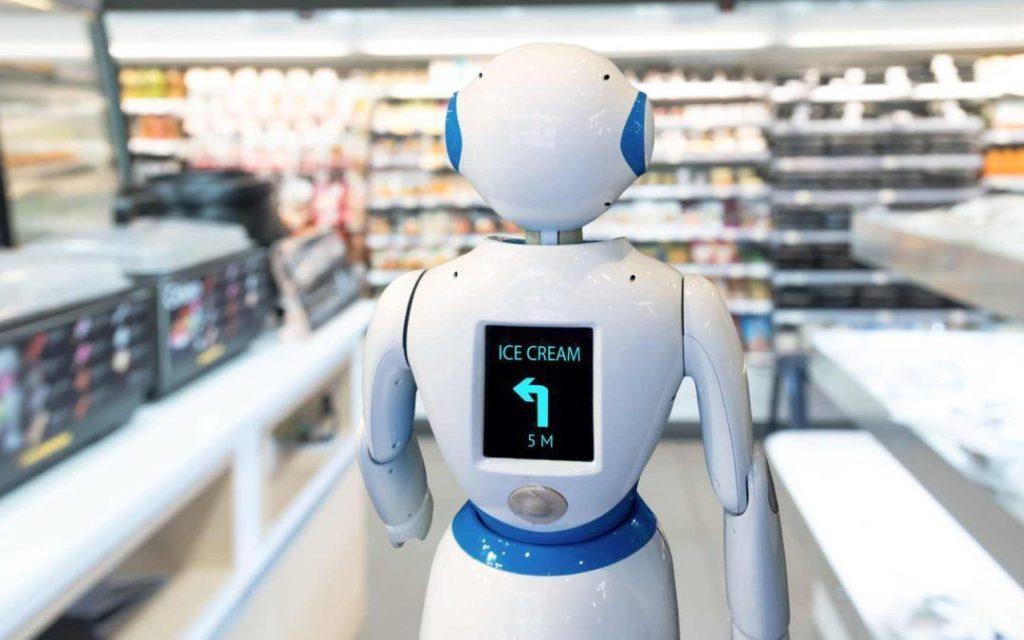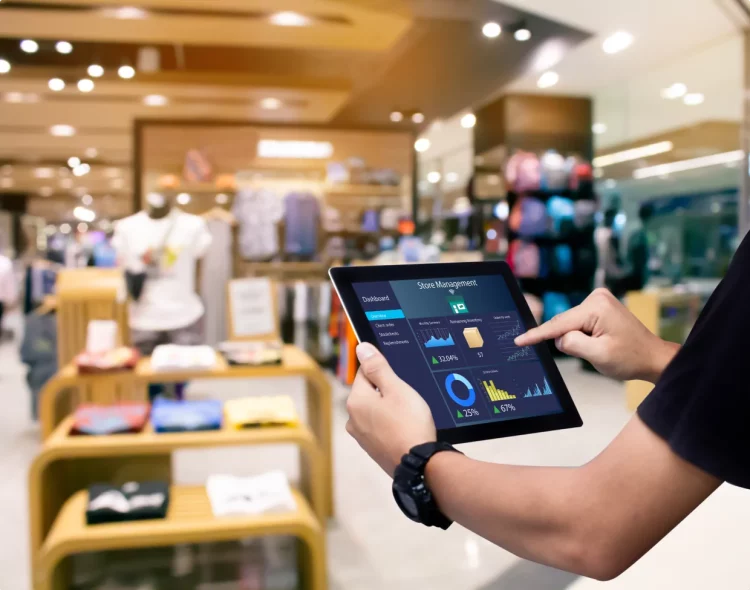The retail industry is undergoing a transformative revolution, driven by the rapid integration of artificial intelligence (AI) technologies. From online shopping experiences to brick-and-mortar stores, AI has become a pivotal player in shaping how retailers engage with customers, manage inventory, and streamline operations. In many ways, AI is becoming the “new store manager”—handling a wide range of tasks traditionally managed by humans, while providing significant benefits in efficiency, personalization, and customer satisfaction. This article will explore the various ways AI is reshaping retail, from customer service chatbots to inventory management and personalized shopping experiences.
1. AI-Powered Chatbots: Revolutionizing Customer Service
In recent years, AI-powered chatbots have emerged as essential tools in retail, enhancing the customer service experience by offering instant, 24/7 assistance. These intelligent bots are capable of handling a wide variety of customer inquiries, from order status and product availability to answering frequently asked questions. Thanks to advancements in natural language processing (NLP), chatbots can engage in conversations that feel increasingly human-like, helping customers find the products they need or resolve issues quickly.
1. 24/7 Availability and Instant Responses
One of the major advantages of AI chatbots is their ability to provide support around the clock. While human customer service agents are limited by working hours, AI chatbots are available to assist customers at any time of the day or night, making them especially useful for global retailers with customers in different time zones. Furthermore, these bots can provide instant responses to queries, significantly reducing the wait times that often occur when reaching out to human agents. This leads to an improved overall customer experience and higher satisfaction rates.
2. Personalized Customer Interactions
AI chatbots can also learn from each interaction and offer increasingly personalized experiences. By analyzing data such as a customer’s past purchases, browsing history, and preferences, chatbots can recommend products tailored to the individual’s needs. For example, a chatbot might suggest clothing items based on a shopper’s previous purchases or provide updates on sales for products they’ve previously shown interest in.
Personalization helps to build a stronger connection between customers and retailers, fostering a sense of loyalty. With chatbots, businesses can offer the same personalized touch that a human associate might provide, but with greater speed and efficiency.
2. AI in Inventory Management: Streamlining Operations
In addition to improving customer-facing interactions, AI is revolutionizing the backend of retail operations. One area where AI is particularly impactful is inventory management. Retailers are adopting AI-powered systems to optimize stock levels, predict demand, and reduce waste.
1. Predicting Demand and Managing Stock
AI systems can analyze vast amounts of data, including sales trends, seasonal patterns, and external factors like weather, to accurately predict future demand for products. This allows retailers to stock their stores and warehouses more efficiently, ensuring that popular items are readily available while avoiding overstocking on less popular products. Accurate demand forecasting also minimizes the risk of stockouts, which can lead to lost sales, or excessive inventory, which ties up valuable resources.
For example, AI algorithms can identify when a particular product is likely to see a surge in demand, such as a popular toy before the holidays or a specific brand of sunscreen during the summer months. Retailers can use this information to order just the right amount of stock, avoiding costly overstock situations or empty shelves.
2. Automating Replenishment and Restocking
AI is also helping to automate the replenishment process, ensuring that inventory is restocked at the right time. With AI-driven solutions, retailers can set up automated systems that monitor inventory levels and place restocking orders as needed, eliminating the need for manual checks and stock counting. This real-time inventory tracking reduces human error and ensures that stock is available when customers want it, whether they’re shopping in-store or online.
Furthermore, AI tools can track sales data across multiple channels, such as physical stores, websites, and mobile apps, to ensure stock is appropriately distributed across all locations. For example, if a hot-selling item is selling well at one location, AI can alert management to move stock from other stores or warehouses to meet demand.

3. Personalized Shopping Experiences: Enhancing Customer Engagement
Personalization is one of the most powerful ways AI is transforming retail, as consumers increasingly expect tailored shopping experiences. Through the use of AI, retailers can gather insights about customer preferences and behaviors to deliver a highly personalized shopping journey, both online and in physical stores.
1. Personalized Product Recommendations
Online shopping platforms powered by AI can recommend products to customers based on their browsing and purchasing behavior. These recommendation engines use machine learning algorithms to analyze past purchases, clicks, and search history, suggesting products that match a customer’s specific tastes or needs.
For example, when a customer shops for a pair of shoes, the website may recommend complementary products, such as matching socks, handbags, or shoe accessories. These personalized recommendations drive higher sales and create a more enjoyable shopping experience for customers, who are likely to return for the convenience and tailored suggestions.
2. In-Store Personalization with AI
The shift towards personalization is not limited to online shopping. In physical stores, AI is enhancing the in-store experience by tailoring product recommendations, offers, and promotions based on a customer’s previous shopping patterns. Retailers can use technologies such as beacons and facial recognition (with customers’ consent) to send personalized promotions to smartphones as shoppers move through aisles. For example, if a customer frequently purchases eco-friendly products, they might receive an offer on sustainable brands as they browse.
Additionally, AI can assist sales associates by providing them with customer data in real-time, empowering them to offer relevant recommendations and insights directly to customers. This enables store staff to deliver a more personalized and targeted service, ultimately increasing sales and customer satisfaction.
4. AI in Fraud Prevention and Payment Security
Security is a top concern for both retailers and consumers in today’s digital age, and AI is playing a crucial role in preventing fraud and ensuring the safety of financial transactions. By analyzing customer behavior and transaction patterns, AI can identify suspicious activities and flag them for further investigation.
1. AI Fraud Detection Algorithms
AI-driven fraud detection algorithms are capable of identifying unusual or fraudulent behavior, such as sudden large transactions or atypical purchasing patterns. These algorithms can learn from past transactions to detect anomalies and flag potentially fraudulent activity in real-time. For example, if a credit card is used for a purchase in a different location than usual, the system can trigger an alert to verify the transaction’s legitimacy.
This helps retailers protect themselves from fraudulent activities, reducing chargebacks, identity theft, and other security risks. AI also assists in verifying customer identities using biometric data, such as facial recognition or fingerprints, ensuring secure payment processing.
5. The Future of AI in Retail: Opportunities and Challenges
While AI’s impact on retail is already profound, its potential is far from fully realized. In the future, we can expect even more advanced applications of AI in areas like virtual assistants, augmented reality shopping experiences, and autonomous stores.
1. AI and the Rise of Autonomous Retail
The concept of autonomous retail stores, where customers can shop without ever interacting with a human cashier, is gaining traction. Companies like Amazon are already experimenting with cashier-less stores, where AI tracks what items customers pick up and automatically charges them when they leave. These stores rely on AI-powered computer vision, machine learning, and sensors to monitor customer activity and manage inventory.
2. Ethical Considerations and Data Privacy
As AI continues to play a larger role in retail, there will be ongoing debates around data privacy and ethics. Retailers must ensure that they are transparent about the data they collect and how it is used, especially as AI systems become more integrated into customers’ lives. Striking the right balance between personalization and privacy will be key to maintaining customer trust and confidence.
6. Conclusion: AI is the New Store Manager
The integration of AI into retail is fundamentally reshaping how businesses interact with customers and manage their operations. From AI-powered chatbots that provide instant customer support to AI-driven inventory management systems that ensure stock is optimized, the impact of AI on retail is vast and transformative.
As AI technology continues to evolve, retailers will find even more ways to enhance the shopping experience, streamline operations, and drive profitability. AI is not just a tool; it is becoming the new store manager—working tirelessly to deliver smarter, more efficient, and more personalized retail experiences that benefit both businesses and consumers alike.











































Discussion about this post